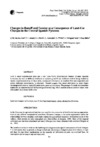Identificador persistente para citar o vincular este elemento:
https://accedacris.ulpgc.es/jspui/handle/10553/76649
| Campo DC | Valor | idioma |
|---|---|---|
| dc.contributor.author | García-Ruiz, José M. | en_US |
| dc.contributor.author | Lasanta Martínez, Teodoro | en_US |
| dc.contributor.author | Martí Bono, Carlos Enrique | en_US |
| dc.contributor.author | Gonzáles, Constanza | en_US |
| dc.contributor.author | White, S. | en_US |
| dc.contributor.author | Ortigosa Izquierdo, Luis María | en_US |
| dc.contributor.author | Ruíz Flaño, Purificación | en_US |
| dc.date.accessioned | 2020-12-14T16:33:37Z | - |
| dc.date.available | 2020-12-14T16:33:37Z | - |
| dc.date.issued | 1995 | en_US |
| dc.identifier.issn | 0079-1946 | en_US |
| dc.identifier.other | Scopus | - |
| dc.identifier.uri | https://accedacris.ulpgc.es/handle/10553/76649 | - |
| dc.description.abstract | Both in small experimental plots and in the "Aísa Valley Experimental Station" (Central Spanish Pyrenees), the role of different land-uses in explaining runoff and sediment yield is being studied in closed, experimental plots. In these plots, continuous information on overland flow and suspended and solute sediment concentration is obtained. Results suggest that cereal cultivation in steep slopes encourages soil erosion, especially under non-conservative systems. The passage of cereals into meadows represents an improvement of the hydrological functioning, which reaches its most positive values with colonization by a dense shrub cover. | en_US |
| dc.language | eng | en_US |
| dc.relation.ispartof | Physics and Chemistry of the Earth | en_US |
| dc.source | Physics and Chemistry of the Earth [ISSN 0079-1946], v. 20 (3-4), p. 301-307, (Enero 1995) | en_US |
| dc.subject | 250507 Geografía física | en_US |
| dc.subject.other | Farmland Abandonment | en_US |
| dc.subject.other | Land-Use Changes | en_US |
| dc.subject.other | Plant Colonization | en_US |
| dc.subject.other | Pyrenees | en_US |
| dc.subject.other | Runoff | en_US |
| dc.subject.other | Soil Erosion | en_US |
| dc.title | Changes in runoff and erosion as a consequence of land-use changes in the Central Spanish Pyrenees | en_US |
| dc.type | info:eu-repo/semantics/Article | en_US |
| dc.type | Article | en_US |
| dc.identifier.doi | 10.1016/0079-1946(95)00041-0 | en_US |
| dc.identifier.scopus | 0029538632 | - |
| dc.contributor.authorscopusid | 35518173100 | - |
| dc.contributor.authorscopusid | 6603445114 | - |
| dc.contributor.authorscopusid | 56250888100 | - |
| dc.contributor.authorscopusid | 25934357800 | - |
| dc.contributor.authorscopusid | 7404080189 | - |
| dc.contributor.authorscopusid | 6602105609 | - |
| dc.contributor.authorscopusid | 6602272876 | - |
| dc.description.lastpage | 307 | en_US |
| dc.identifier.issue | 3-4 | - |
| dc.description.firstpage | 301 | en_US |
| dc.relation.volume | 20 | en_US |
| dc.investigacion | Artes y Humanidades | en_US |
| dc.type2 | Artículo | en_US |
| dc.utils.revision | Sí | en_US |
| dc.date.coverdate | Enero 1995 | en_US |
| dc.identifier.ulpgc | Sí | en_US |
| dc.contributor.buulpgc | BU-HUM | en_US |
| item.fulltext | Con texto completo | - |
| item.grantfulltext | open | - |
| Colección: | Artículos | |
Citas SCOPUSTM
31
actualizado el 08-jun-2025
Citas de WEB OF SCIENCETM
Citations
25
actualizado el 08-feb-2026
Visitas
44
actualizado el 10-ene-2026
Descargas
80
actualizado el 10-ene-2026
Google ScholarTM
Verifica
Altmetric
Comparte
Exporta metadatos
Los elementos en ULPGC accedaCRIS están protegidos por derechos de autor con todos los derechos reservados, a menos que se indique lo contrario.
